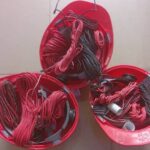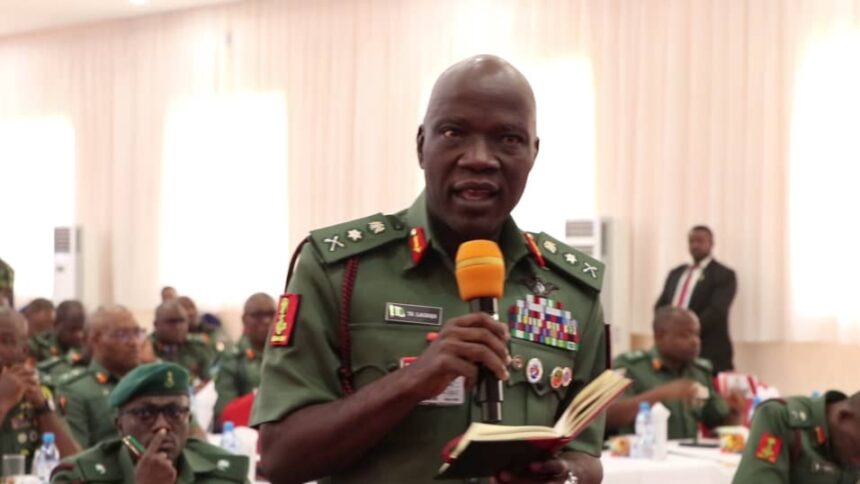By Augustine Ehikioya
The Chief of Army Staff (COAS), Lieutenant General Taoreed Lagbaja, on Thursday warned that ending insecurity in the country may be impossible until development of the grassroot and placing governance at the local level.
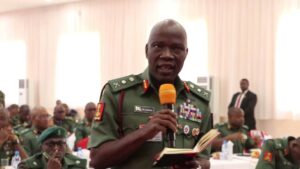
He pointed out that what is driving insecurity in the country is the non-existence of governance at the local level.
The Army Chief spoke during the 2024 Nigerian Army Day Celebration (NADCEL) Lecture and Award Ceremony For COAS Literary Competition in Jos, Plateau State. Security Watch Africa (SWA) crew was there.
Making a remark after the lecture titled ‘Combating Complex Conflicts In Nigeria: Challenges and Strategies’ delivered by Lieutenant General Lamidi Adeosun (Rtd), the Army Chief also said that creating Development Commissions for all the zones in the country won’t solve the problem of insecurity.
He said “Implementation of some of these strategies in the field is somehow difficult. Governance at the local level is non-existent and that is what is driving insecurity, not only in the North East, even in the North West and across the country.
“So, the strategy from the guest lecturer about establishing developmental Commission for each of the regions, I am somehow sceptical about it.
“Why is it that the elites have been a resistant to the local government autonomy that people have talked about. That’s the sure way to bring development to the grassroot.
“Not by creating commissions, not by establishing bureaucracy. Where we have bureaucracy let us fund it and make it work.
“Until we take development to the grassroot, then we will not solve the problem of insecurity,” he stated
With the current inflation and the high naira exchange rate to foreign currencies, the COAS said, no amount budgeted to defence will be a quick fix.
He added “What I think is most important is how do we bring development to these crisis-hit regions.
“We want development in the field. That will aid our operations, it will aid the agitators and that will go a long way to subside the restiveness.” he said
According to him, the regulation of the media is not about censorship, saying “but I think the challenge is in the use of social media and..”
Concluding on the strategies, he said, “We can always discuss it but the implementation in the field will be difficult.”
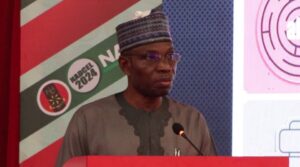
Delivering the lecture, Lt Gen Adeosun noted that despite the achievements been recorded by the Nigerian military, the environment has remained volatile.
He suggested the need for Nigeria to study other countries like Sri Lanka and Colombia, that have gone through similar crises in the past.
Stressing that committed efforts of all stakeholders helped to end terrorism in the two countries, he said it is important for any nation that wants to successfully combat terrorism to acquire high technology and platforms, high communication system, regulation of the media, as he noted that media censorship helps to reduce fear.
On the strategies to effectively combat the complex conflicts in Nigeria, he said there is need to improve the social economic needs of the people, creating development commission for other zones that don’t have, security sector reforms to tackle crimes and conflicts before they become complex conflicts.
Other suggestions, he said, is merging other paramilitary outfits like NSCDC with the Nigeria Police to do the job during crisis, improving funding for fighting complex conflicts, prioritizing operational equipment for the Nigerian Army.
He also suggested strengthening media relations, and sustaining intelligence gathering and sharing.

During the discussion/interactive session on the lecture, Major General Stevenson Olabanji (Rtd) blamed the elites for the crises.
The political elites, he said, divide the people for their political gains.
He added “Proliferation of small arms and light weapons is critical to the complexity of the crisis we are facing now.”
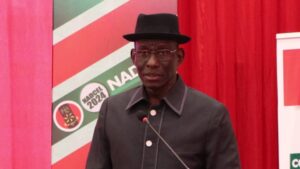
The former Chief of Defence Staff, General Lucky Irabor (Rtd), maintained that the complex conflicts facing Nigeria require out of the box measures to tackle them.
He also noted that there should be conversation which should dovetail into the security reforms.
Stressing that the regulation of the media is not appropriate, he noted that power without control is dangerous.
“Media must have some form of control” he stated.
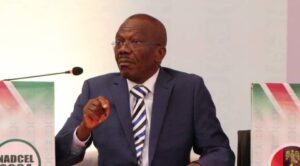


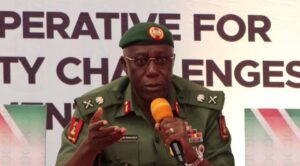
Before the lecture drew to a close, there was presentation of souvenir by the Army Chief, presentation of awards and dummy cheques to the winners of the COAS Literacy Competition.
A 10 years old boy, who is a young artist, Joshua Morenikeji, also presented a pencil drawing of the COAS to the Army Chief at the lecture.
While there was group photographs at the event, General Lagbaja also launched the 7th edition of the Nigerian Army Research Centre journal.





